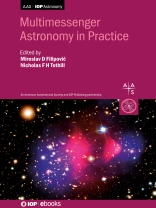The first non-electromagnetic messengers from space were discovered in the early 20th century, but it is only now that multimessenger astronomy is coming into its own. The aim of Multimessenger Astronomy in Practice is to aid an astronomer who is new to research in a particular area of multimessenger astronomy. Covering electromatic radiation from radio through to gamma-rays, and moving on to neutrino, cosmic-ray and gravitational wave astronomy, it gives the reader an overview of the celestial objects detected in each region, the unique methods used to measure them, as well as the principles and methods of data collection, calibration, reduction and analysis. Further chapters cover dark matter, the multimessenger search for extraterrestrial intelligence (SETI), and data science with machine learning. The book will help educate astronomy students taking a multimessenger approach, and add to the knowledge of professional astronomers about what is available in today’s multimessenger toolbox.
Key Features
- Prepares astronomers new to research in a particular area of multimessenger astronomy
- Covers modern astrophysics across the electromatic spectrum from radio through to gamma-rays, as well as neutrino, cosmic-ray and gravitational wave astronomy
- Details the celestial objects detected in each region, the detection methods used, and the principles and methods of data collection, calibration, reduction and analysis
- Includes chapters on dark matter, the multimessenger search for extraterrestrial intelligence (SETI), and data science with machine learning
Tabela de Conteúdo
Preface
Foreword
Acknowledgements
Editor Biographies
Author Biographies
Contributors
1 Multimessenger Astronomy in Practice: Celestial Sources in Action
2 Long-wave (Radio) Astronomy with Coherent Detection from Radio to THz
3 Long-wave Astronomy with Incoherent Detection
4 Visual and Near-infrared Astronomy
5 Ultraviolet Astronomy
6 X-Ray Astronomy
7 Gamma-Ray Astronomy
8 Neutrino Astronomy
9 Gravitational Wave Astronomy
10 Dark Matter
11 Multimessenger SETI and Techniques
12 Data Science (Mining and Processing) with Machine Learning in the Era of Multimessenger Astronomy
Sobre o autor
Professor Miroslav D. Filipović is a scientist, philosopher and philanthropist with over 30 years of experience in astronomy. Since May 2002, Professor Filipović is affiliated with the Western Sydney University (WSU), and has been responsible for the development of Astronomy at WSU. He is Chair of the largest public Observatory in Australia (the WSU’s Penrith Observatory), and has over 200 refereed publications. His research interests centre on supernovae, high-energy astrophysics, planetary nebulae, Milky Way structure and mass extinctions, H II regions, X-ray binaries, active galactic nuclei, deep fields, and stellar content in nearby galaxies. All of this research is closely related to further our understanding of the interactions between galaxies and the processes of stellar formation and star evolution as they affect galaxy evolution.
Nicholas F. H. Tothill joined Western Sydney University in 2011, where he is now Senior Lecturer in the School of Science and Director of the Penrith Observatory. He is a member of the Astronomical Society of Australia and the International Astronomical Union. His research centres on the interstellar medium of the Milky Way, but includes topics as diverse as high-redshift galaxy surveys, Antarctic astronomy, and cosmic-ray astrophysics.












